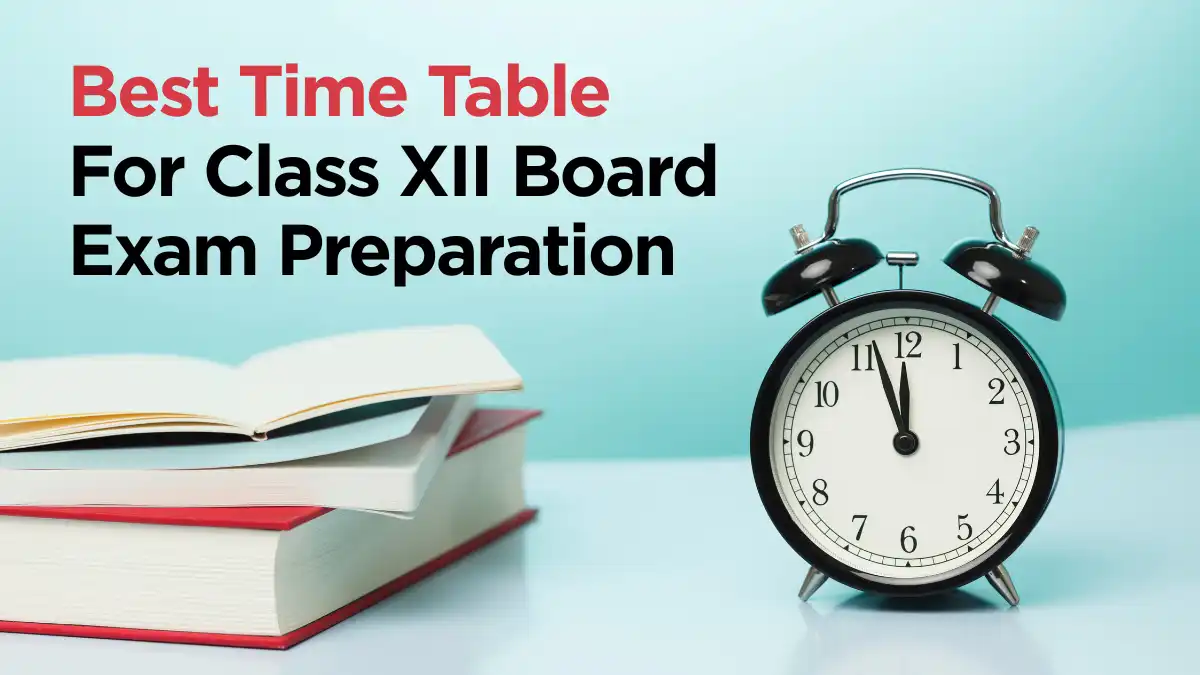This Time Table for Class 12 is a simple plan that helps you study without panic. If you follow a clear plan each day, you will finish your syllabus bit by bit. This guide gives a flexible routine for CBSE students. You will learn how to use your fresh hours for hard topics, how to keep short breaks, and how to use weekends well. The plan shows sample day and week templates you can change. It also explains what to do in the last thirty days before boards. Read it, pick what fits you, and change it as you go as Small steady steps win the race.
Why a Time Table Matters
When you have many chapters and many subjects, you can feel stuck. The Best Time Table for Class 12 gives you one clear thing to do every hour. That lowers worry and helps you start fast each day.
How it reduces stress
Seeing a list of small tasks makes your mind calm. Marking one task done gives a little joy. Many small wins build real confidence before the exam.
How it helps you cover the syllabus
A flexible Best Time Table for Class 12 makes sure no subject is left out. Put each subject into the plan every week. Repeat tough topics more often so they stick in your memory.
Also Read: Best Reference Books for Class 12th CBSE
Build your Daily Time Table
We use flexible blocks. Each block is a focused study time with a short break after it as You can change the start time based on your school hours or coaching.
- Study block idea: 45–60 minutes study + 10–15 minutes break.
- Why blocks: Short focused blocks keep your brain fresh.
Morning routine
Use morning hours for hard learning. The Best Time Table for Class 12 suggests that if you do maths or physics, solve problems in the morning when you are fresh. New learning is easiest in the first study block.
Afternoon routine
After lunch, energy falls a bit. Do light tasks then: read notes, revise shorter topics, or do language practice and Take a short walk to wake up the mind.
Evening routine
Evenings are good for test practice. Solve past questions, time yourself, and make quick error notes and Keep one small slot for planning the next day.
Also Read: How to Get Full Marks in Maths Class 12
Weekly and Monthly Planning
Plan so every subject appears twice a week. Keep one day for a longer review or a mock test. Each month, do a full mock and check which topics need more work.
Weekly checklist:
- Two focused sessions for each major subject
- One session for language and board writing practice
- One session for doubt clearing with teachers or friends
- One mock or past-paper slot
By following this weekly rhythm, the Best Time Table for Class 12 ensures balance and steady progress.
Subject-wise Time Split
All subjects are important. But give more time to the subjects you find hard. For many CBSE students this means more practice for maths and more revision for science.
Example split for a student with five subjects (flexible):
- Two hardest subjects — larger blocks in morning or first slots.
- Two medium subjects — steady daily short blocks.
- Language/optional subject — short daily practice to keep flow.
The Best Time Table for Class 12 adjusts this pattern based on your weak and strong areas.
Sample Timetables
Sample weekday plan
- Morning block — New topic or problem solving (45–60 min)
- Mid-morning — Short break then lighter study (45 min)
- Early afternoon — Notes revision / language (45 min)
- Late afternoon — Short practice test or solved example (45–60 min)
- Evening — Revision and quick recap (30–45 min)
Change the order if your school or coaching hours fit differently. The Best Time Table for Class 12 idea is to place your strongest work where you feel most alert.
Sample weekend plan
Use weekends for deeper practice. Take one full past paper on Saturday morning under timed conditions. On Sunday, review errors and make small correction notes. Keep one evening free for rest and a hobby.
Exam Month (last 30 days) Strategy
In the last thirty days do not learn many new big topics. Finish small pending parts in the first ten days. Next ten days, do focused revision and topic-wise past questions. Final ten days, do at least three full timed papers and read only your short notes before sleep.
Do not cram: New big chapters in the last week can raise stress and lower recall. Stick to what you have already revised. The Best Time Table for Class 12 focuses on polishing what you already know.
Tips, Habits and Common Mistakes
Small habits make a big difference as Sleep well, eat simple healthy food, take short walks, and talk to teachers when stuck. Avoid long non-stop study without breaks.
- Good habits: daily short notes, steady sleep, regular mocks.
- Common mistakes: skipping weak subjects, long non-stop hours, last-minute cramming.
- Motivation tip: keep a small reward after each finished topic — a cup of tea, a walk, or a short call with family.
These small things will make your Best Time Table for Class 12 practical and enjoyable.
Quick Checklist Before Exam Day
- Admit card and photo ID ready
- Short revision notes only — no new learning
- Light sleep and simple meals
- Reach exam centre early and calm
Frequently Asked Questions
Q1: How many hours should I study daily for Class 12 boards?
A: Quality is more important than hours as CBSE, aim for steady focused study in flexible blocks. Many students do six to nine focused hours spread across the day with breaks. Follow the Best Time Table for Class 12 that suits your routine.
Q2: When should I start full revision?
A: Start strong revision at least two months before boards. Use the last month mainly for past papers and short summary notes.
Q3: How to revise if I have many subjects?
A: Rotate subjects each day so each subject appears twice a week. Use one day for mixed practice and one day for doubt clearing. The Best Time Table for Class 12 ensures no subject is missed.
Q4: What if I miss a day from my plan?
A: It is fine. Move the missed blocks into the next two days. Keep the plan flexible — small slips do not break your preparation if you catch up calmly.
Q5: How to keep calm before the exam?
A: Read only your short notes, sleep well, and avoid new chapters. Light walks and breathing help calm the mind before the exam.









